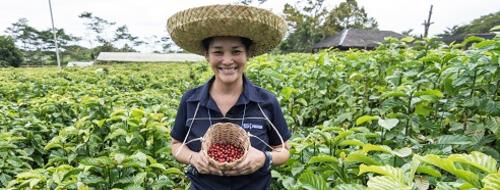With Christmas just right around the corner, there is a certain buzz of excitement in the air. Everyone is busy sprucing up their houses with holiday decorations, buying gifts, and planning get-togethers. While it is the most wonderful time of the year for most, it may not always be as wonderful for the planet.
The holiday season generates the biggest volume of garbage in the country, according to the Department of Environment and Natural Resources (DENR). As Christmas parties and gift giving start to pick up, it’s good to remain mindful of the amount of waste we produce. Make your celebrations more meaningful by observing ways to lessen your impact on the environment and doing more for the planet. Start today by practicing the 12 Rs of Christmas!
- Remember - Remember that this season is not all about spending on material things and expensive gifts—it’s about giving time to the people you love the most. Take this moment to reconnect with them, with yourself, and maybe even with nature.
- Refuse - Holiday shopping can be tiring, so when you sit down to take a break at a cafe or restaurant, make sure to refuse anything unnecessary such as plastic utensils or cups. It’s also best to bring your own reusable shopping bags for your purchases.
- Reduce - With all the get-togethers during Christmas, reduce your food waste by only preparing and cooking food that you and your family or friends can finish. This also applies when ordering food delivery or dining out. Don’t forget to take home your leftovers and store them properly as well!
- Recover - If you have more free time during the holidays, why not declutter your home and go through your storage to recover old forgotten items? Instead of throwing these away, think of alternative ways to use them again or look for places where you can donate them.
- Rethink - Rethink your usual choices and buying habits. This year, choose to support small enterprises that make their products locally, or those that use sustainable materials. Reusable and/or recyclable items are great, too. Of course, make sure to purchase items that are of quality so they can last longer.
- Reuse - You can always reuse old wrappers, scrap papers, and newspapers to wrap your gifts and add your own design for a more personal touch. When it comes to Christmas decors, ornaments from previous years can still be used again or better yet, you can craft your own decor from items you find in your house.
- Rewrite - After wrapping your gifts, it’s time to put your well wishes on your holiday cards for your family and friends. For a more customized feel, rewrite your messages on cards that you can make with scrap or recycled paper. Did you know you can also use seed paper for this so the recipient can plant your card after reading your note?
- Regift - The concept of regifting is sometimes frowned upon, but it’s definitely one of the most economical and sustainable ways to give this holiday season. Rather than keeping unused gifts in storage, it’s much better to pass them on to people who can use them better.
- Repair - A good project to start this Christmas is to look for slightly broken or damaged items sitting in your house and repair them (or have them repaired if you aren’t too much of a handyman). Instead of discarding old electronics and furniture right away, you can try giving them a second life.
- Repurpose - Speaking of giving things a second life, you can also try repurposing things like cardboard boxes, Tetrapacks, and plastic bottles into many useful things such as storage boxes, organizers, and even plant pots.
- Recycle - The things that you cannot reuse or upcycle at home must be recycled to prevent adding more to the country’s growing waste generation rate. You can check out recycling facilities near you through rplr.co/PlasticDropMap.
- Responsible - Each one of us must be responsible for our waste, so always remember the 3Rs: reduce, reuse, and recycle, in that order. Reduce what you can, reuse items that you can, and properly segregate your waste before sending them out to waste collectors and/or recyclers. To find out how you can take action, visit https://www.nestle.com.ph/csv/planet/being-kasambuhay-for-the-environment.
As Kasambuhay for Good, Nestlé Philippines aims to shape a waste-free future through its initiatives to tackle plastic waste in the country, including developing the packaging for the future, increasing collection and recycling efforts, and driving new behaviors and understanding through solid waste management (SWM) education. It is also the first multinational fast moving consumer goods company (FMCG) in the Philippines to achieve plastic neutrality, collecting and diverting 62 million kilos of plastic away from the environment since August 2020.




